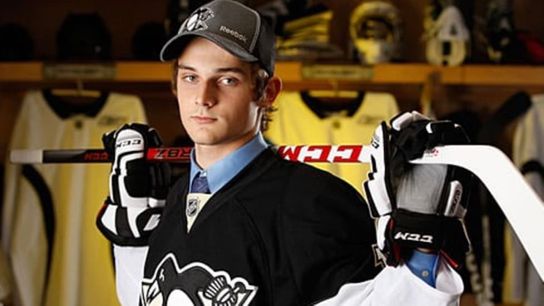COLUMBUS, Ohio — Teddy Blueger sat in a hotel restaurant in Minneapolis with his girlfriend and his two agents during the 2019 AHL All-Star break. He was hungry, but not for anything on the menu.
He craved opportunity.
For 2-1/2 seasons, this Latvian-born center and prospect in the Penguins' system had done everything the organization asked of him. He improved his skating. He developed his penalty-killing prowess. He worked his way up the depth chart and was scoring at nearly a point-a-game pace. Coaches had to almost beg him to leave the ice long after practices ended. Blueger had become the bane of Wilkes-Barre/Scranton Zamboni drivers, men who just wanted to resurface the rink and call it a day.
All the reports to management on Blueger, a 2012 second-round draft pick, were positive. But there he was, seated across the table from his agents, a 24-year-old prospect yet to play an NHL game, facing an uncertain future.
The foursome broke bread and tried to keep the mood light. In the back of his mind, however, Blueger knew a more serious conversation could be coming.
“If I had gotten to end of that season and nothing had changed, it definitely would have been worth reassessing, and maybe asking to go somewhere else to see if I could get my chance,” he said.
Such is the blessing and curse of a minor-league prospect in an organization with a Stanley Cup pedigree. It’s almost always about the present. It’s almost always about surrounding Sidney Crosby and Evgeni Malkin with veterans who can help them lift the trophy again. The future can wait and, in some cases, be dealt to other franchises for free-agent rentals.
Where did that leave Blueger? Sitting in snowy Minneapolis knowing he was a day away from returning to his minor-league apprenticeship.
That’s when his cell phone rang, and everyone at the table watched as Blueger answered the call and saw his face light up. On the other end of the line was opportunity. It was the Penguins.
After 196 games spent in Wilkes-Barre/Scranton, Blueger was headed to Pittsburgh.
____________________

PENGUINS
Teddy Blueger was the No.52 overall pick in the 2012 NHL Draft.
In the final frantic minutes of Tuesday night’s 2-1 Penguins’ victory over the Islanders, Blueger was on the ice at PPG Paints Arena. The Islanders were buzzing in the offensive zone, trying to capitalize on their lone power play. New York’s net was empty in favor of an extra attacker. The crowd of 9,433 fans was at full throat, hoping its encouragement could get the home team over the line at winning time.
It’s moments like these when Blueger is happy he heeded the advice of Shattuck-St, Mary’s coach Tom Ward and Minnesota State coach Mike Hastings.
From the day he had been drafted, Blueger was advised to take a hard and realistic look at the Penguins’ roster. Was he going to supplant Crosby or Malkin as a center on Pittsburgh’s top two lines? If Pittsburgh was in his future, Blueger needed to focus on finding work as a bottom-six forward. Learn how to kill penalties and make use of his best asset.
“His hockey mind is a beautiful one,” Ward said. “Teddy thinks the game so clearly. He’s a bit of a unique skater with his wide stride, but he’s so smart and he anticipates plays so well. It allows him to get where he needs to be.”
Blueger paced the Penguins with three shorthanded goals this season, two behind league leader Connor Brown of Ottawa.
On this night, his team didn’t require any heroics —just a solid 32-second shift to cap a terrific game. Blueger, Brandon Tanev and Zach Aston-Reese had been outstanding in supplying a physical edge and a tenacious forecheck. The unit helped keep the dangerous Mat Barzal and Jordan Eberle off the scoresheet for a second consecutive game.
The East Division playoff series features two of the NHL’s top fourth lines. The Islanders’ Casey Cizikas, Cal Clutterbuck and Matt Martin are known as the Identity Line because of how their gritty play embodies the way Barry Trotz wants his club to approach its task. They are given the responsibility of the first shift in each period.
Tuesday night, Blueger, Tanev and Aston-Reese were the game’s tone setters. Tanev delivered a crushing hit on Brock Nelson in the opening minutes and Blueger’s dogged work below the hash marks created an early scoring chance.
“We complement each other pretty well,” Blueger said recently of his line mates. “Zach is physical, good on the wall. Tans brings speed and tenacity. I’m just there to support both of them. The fact we’ve had success in the past gives us confidence we will have success again.”
It’s not exactly how Blueger envisioned his NHL experience growing up in Riga, Latvia, attending his dad’s beer league games and idolizing Peter Forsberg. But as he skated to the bench, the puck cleared from the Penguins’ zone in the dying seconds, the 6-foot, 185-pounder had again rewarded Mike Sullivan’s faith in him.
Blueger still has played more games in the minors than he has in the NHL, 147 appearances counting postseason, yet nobody can mistake the progress. His story is one of sweat-stained perseverance.
____________________

GETTY
Teddy Blueger scores a goal at the 2018 world championships.
The man who coached Crosby and other future NHL players at the dynastic prep school in Faribault, Minn., has seen many changes to the game over the past 20 years.
Ward marvels at the cost of chasing a hockey dream nowadays. The $300 sticks, the $1,500 pairs of skates. To his way of thinking, it’s altered the game’s demographics and its geography.
“It used to be the old man is dusting off the sawdust from his jeans and dropping his kid off and going to the Legion to have a smoke and a beer and coming back to pick him up,” the legendary Shattuck-St. Mary’s coach said. “Now it’s like polo. You can go a long way between Calgary and Winnipeg, in the heart of the Canadian Prairies, and not find a hockey player.”
Ward’s rosters have included kids from all over Europe. So when Valentin and Jana Blueger made their 2008 visit to campus, located about 50 miles south of the Twin Cities, it wasn’t a shock.
Valentin was an attorney and a member of the Latvian hockey federation armed with the financial capital to give Teddy a chance to play in the United States and receive a quality education. There would be nothing lost in translation seeing how Teddy had attended the International School of Latvia, which catered to children of embassy employees and foreign businessmen.
While Blueger comes from money, Ward did not detect a whiff of entitlement. Over four seasons, the teenager put the team first and earned his ice time in helping Shattuck-St. Mary’s capture back-to-back national titles in 2011-12.
In Blueger, Ward didn’t see the next Crosby, but the desire and talent were evident.
“Teddy was a rink rat, always working on different parts of his game,” Ward said. “He’s had a growth mindset anywhere he’s gone. Some people thought his skating would be his Waterloo, but he’s just kept at it.”
Ward connected Blueger with acclaimed skating coach Barry Karn in Minnesota. Karn improved the youngster’s balance and explosiveness. Blueger went from needing 12 or 13 strides to go from blueline to blueline to six or seven strides. It’s one reason why Sullivan occasionally deploys Blueger in 3-on-3 overtime because there’s no fear of him failing to keep pace.
The Penguins made him the 52nd overall pick in 2012 and were happy to see him take the collegiate route, choosing to attend Minnesota State, where he would earn his degree.
Hastings spotted Blueger’s potential, but also recognized some minor flaws in his preparation.
“He would come in for practice and look like he had peeled himself off a couch,” Hastings recalled. “With some guys, you’re not sure if they just got out of bed or out of the bar. I knew with Teddy it wasn’t the latter.”
Blueger cites his first two seasons at Minnesota State as a turning point in his approach to the game.
“Coach Hastings would always say life is not fair and you can’t control certain things,” Blueger said. “But you gotta control what you can, and make the most of it. I just focused on outworking everyone else around me. I wanted to be the best player every night.”
Blueger did not produce prolific offensive numbers in college — he tallied 11 goals and 24 assists in 41 games as a senior — but he became one of Hasting’s most dependable forwards.
The coach’s best memory of Blueger doesn’t involve a great game or season. It’s how he spent a morning in 2018 at an alumni golf outing when many of his former teammates were suffering from the aftereffects of a night of merrymaking.
“Those guys always wanted to get some ice because it was late summer and they were all getting ready for camp,” Hastings recalled. “But it’s a fun occasion and some times they took it easy and just got ready to play some golf.
“I walked out to the rink and there was Teddy doing his Barry Karn edge work. He had thrown his mouthguard in and went out to skate. I remember thinking, ‘This kid is going to make it.”
____________________

WBS PENGUINS
Teddy Blueger spent parts of four seasons playing for Wilkes-Barre/Scranton.
Tom Kostopoulos was a 36-year-old journeyman in 2016, trying to squeeze a few more years out of pro hockey when he first met Blueger, who was making the transition from college to the minors.
A veteran of 630 NHL games, Kostopoulos was in a transitional phase of his own. He was mentoring prospects such as Jake Guentzel, teaching them lessons they could apply in Pittsburgh. Kostopoulos took an immediate liking to Blueger, who had committed himself to the finer points of defensive play.
“No one ever had to have a conversation with Teddy about working harder, he just gets it,” said Kostopoulos, who now serves as the Penguins’ player development coach. “What he went through is very similar to what I went through as a young player. When you are in the minors that long, you start to wonder, ‘Is this ever going to happen, or am I going to be a career minor-league player?’”
Blueger recorded 21 goals and 24 assists in 70 games during his second full season (2017-18) at Wilkes-Barre/ Scranton. But as several teammates earned call-ups to Pittsburgh, Blueger kept riding the bus from one AHL outpost to another.
He admits frustration began to gnaw at him, but it never reflected in his performance or preparation. Coaches reassured Blueger he was on the right track, even as the Penguins kept adding veterans to their roster.
“Teddy was ready to play in the NHL a year before he got here,” former Penguins general manager Jim Rutherford said. “Players get caught in different situations. There are waivers issues and contract issues (on the parent club). We were very confident he was going to be a good NHL player. We just needed the right time to promote him.”
Rutherford has been around the pro game for more than 50 years as a player and a front-office executive. He’s witnessed prospects lose patience with the development process, especially in organizations in win-now mode like the Penguins.
“Some guys get upset, they lose their focus, they want to be dealt to another franchise,’ Rutherford said. “I know Teddy was anxious, but we never once got into that with him. He was just always determined he was going to make it and play for Pittsburgh.”
Once Blueger pulled on a Penguins sweater, nobody could take it away from him. He played only one more minor-league game, and signed a two-year, one-way deal for $1.5 million in 2019. The center will be a restricted free agent for the Penguins this offseason assuming expansion Seattle doesn’t poach him from their roster if left unprotected.
Blueger is enjoying his best campaign in the NHL, notching seven goals and 15 assists in 43 games. He missed a month-long stretch due to injury, but rebounded to score goals in three consecutive games (March 18-22) upon his return to help the Penguins win a division title.
“Teddy even looks like a hockey player now missing one of his front chiclets,” Ward said.
While Blueger will never attain the Hall-of-Fame status of his idol Forsberg, his strong defensive game should keep him in the league for seasons to come.
“He’s like an octopus,” said fellow countryman and Blue Jackets’ goaltender Elvis Merzlikins. “He’s competitive, he’s tough, he’s never giving up on a play. He’s trying to steal that puck, and that makes him a dangerous player.”
Blueger continues to exasperate Zamboni drivers around the league and at the Penguins’ practice facility. There’s alway more work to be done long after Sullivan blows his whistle to end practice. In that way, he does resemble a Hall-of-Fame forward, who like Blueger, played more than 150 minor-leagues games before sticking in the league.
“When I was working in Tampa, Marty St. Louis was the same way,” said Kevin Ziegler, Blueger’s former personal strength-and-conditioning coach. “It didn’t matter Marty had established himself in NHL for several years. He had the mindset that Teddy has now.”
The Penguins’ forward believes his game can reach another strata. He’s not satisfied with being a fourth liner. There are more goals to be scored, more responsibilities to be shouldered. The hunger has not subsided.
Blueger plays as he practices — like a man who never again wants to wait more than two years for a phone call.
